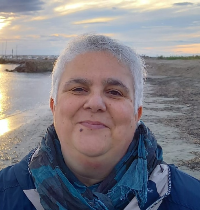
Maria Micaela Coppola
 Rector's delegate to the Language Centre
Rector's delegate to the Language Centre
University of Trento
 Associate professor
Associate professor
Department of Psychology and Cognitive Science
|
|
Education |
|
ACADEMIC POSITIONS
EDUCATION
|
|
|
|
Academic career and teaching activities |
|
ACADEMIC POSITIONS
EDUCATION
|
|
|
|
Research interests |
|
MAIN RESEARCH INTERESTS
|
|
|
|
Research work |
|
Trauma – Ilness – Emotions & Narration Literary texts and narration can be considered as hermeneutical and methodological instruments, which can help us comprehend and manage individual and social traumas and conflicts, and can foster inclusion and respect of differences. Focusing on literary and cultural representations of traumatic events or experiences (such as illness, violence against women, culture clash, marginalisation, or prejudice), this area of research includes the analysis of i. emotions associated with trauma and conflict (fear, anger, pain, shame, helplessness, but also hope, trust, empathy, self-power, and resilience); ii. the strategies for employing literary texts and narrations, in order to promote inclusiveness and respect of differences, build empathy, and enhance narrative and transversal competences; and iii. the professional and educational contexts (healthcare system, university, school, social work, etc.) in which literature can be used for creating inclusive environments, for gaining insight into emotions and stories of trauma and illness, and for developing narrative and transversal competences.
- Dementia in English Literatures and Cultures: This research line aims at i. analysing the strategies through which fiction (novels, short stories, poems, plays, films, graphic novels, etc.) portray the neurological disorders, memory loss, or cognitive deficits commonly associated with Alzheimer’s disease; and ii. exploring if and how narratives can be employed for enhancing empathy, gaining insight, and improving wellbeing in dementia caregiving, healthcare and research contexts. - Stories of Mental Illness: An Interdisciplinary Perspective: For centuries the art of telling stories has been used for representing the complexity of the human mind and identity, and for making sense of the inner chaos and psycho-physical disruption caused (in patients and caregivers) by illness. From this point of view, the literary-cultural discourse and the medical-scientific one are complementary: they attempt to bring order, continuity, and insight. This line of research is aimed at i. exploring the potentialities of this complementarity between literary and medical-scientific narration; and ii. employing narratives for fostering communication skills and transversal competences in professional, scientific research and caregiving contexts. - Gender & Cultural and Literary Representations in English: Woman and lesbian writers in English from the nineteenth century to today, woman and lesbian culture and literature, and cultural representations of gender and of sexual orientation are explored within the feminist and queer theoretical frameworks. This research line is twofold: i. it aims at re-reading and deconstructing the mainstream literary canon and cultural representations, by throwing light on the gaps and silences of the (patriarchal and heterosexist) mainstream culture; ii. its purpose is to re-write alternative canons by giving voice and visibility to the work of ‘marginal’ writers or artists. - Didactics of Literature & Inclusive Didactics: Within the theoretical framework of inclusive didactics and respect of differences (as far as gender, sexual orientation, culture, or language are concerned), this research line follows two tracks. On the one hand, it focuses on the role of literature in producing, transmitting and consolidating gender stereotypes, by illuminating the blind spots and anachronisms in textbooks, anthologies, and literature for children and young learners. On the other, its objective is to analyse and design teaching strategies for re-writing school and academic textbooks, and for involving students, through literature, in a critical reflection on mainstream models of masculinity and femininity. |
|
|
|
Memberships in societies and scientific committees |
|
|
|
|
Awards and honours |
|
|
|
|
Conferences and lectures |
|


